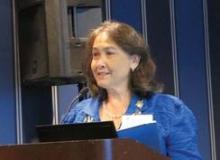"It’s a transformative learning experience. This is an opportunity to critically reflect on their life events, and that helps them to change their beliefs and their behaviors," Dr. Worley said.
The techniques employed include intellectual didactics, peer group exercises, emotional awareness training, and helping participants identify triggers of their inappropriate behaviors.
Early Intervention
Many of the challenges that Dr. Worley and her colleagues address in experienced physicians also confront physicians in training, noted Dr. Mai-Lan Rogoff, an associate professor of psychiatry and associate dean of student affairs at the University of Massachusetts in Worcester.
Medical school wellness programs are primarily aimed at preventing burnout, a problem more common among students than alcohol, substance abuse, or suicidality, Dr. Rogoff said.
She defined burnout as a triad of components as measured by the Maslach Burnout Inventory, a rating instrument developed by Christina Maslach, Ph.D., professor of psychology at the University of California at Berkeley.
Burnout is a combination of emotional exhaustion (feelings of being emotionally overextended and exhausted by your work), depersonalization (feelings of being a cog in a machine, having an unfeeling response toward those who receive your services), and having a low sense of personal accomplishment.
Burnout is associated with a variety of negative outcomes, Dr. Rogoff noted, including loss of empathy, substance abuse, and suicidal ideation.
"There are personal and environmental risks for burnout that are known and described in burnout in various settings. The interesting thing is that if you look at medical students and medical school, both sets of risk factors exist there," she said.
"On a personal level, you’ve got perfectionism, low resilience, negative focus, and all those issues, and environmentally one of the risk factors for burnout is unclear or impossible requirements or excessive workloads. This is the way most medical students feel," she added.
Medical students also acutely feel that there is a lack of time and a lack of control over their own circumstances, and that they face major consequences from mistakes and often have to deal with angry, upset, or ungrateful patients.
Medical school wellness programs address both the personal and environmental risk factors for burnout, with an emphasis on the latter. In addition to making counseling and therapy services readily available to students, wellness programs such as that in place at the University of Massachusetts focus on providing students with an increased sense of institutional support and peer support through group and team activities and exercises.
Although there are no objective data showing that such wellness programs work, "there’s absolutely no question that students like these programs," Dr. Rogoff said.
Dr. Myers, Dr. Worley, and Dr. Rogoff all reported having no relevant conflicts of interest.


